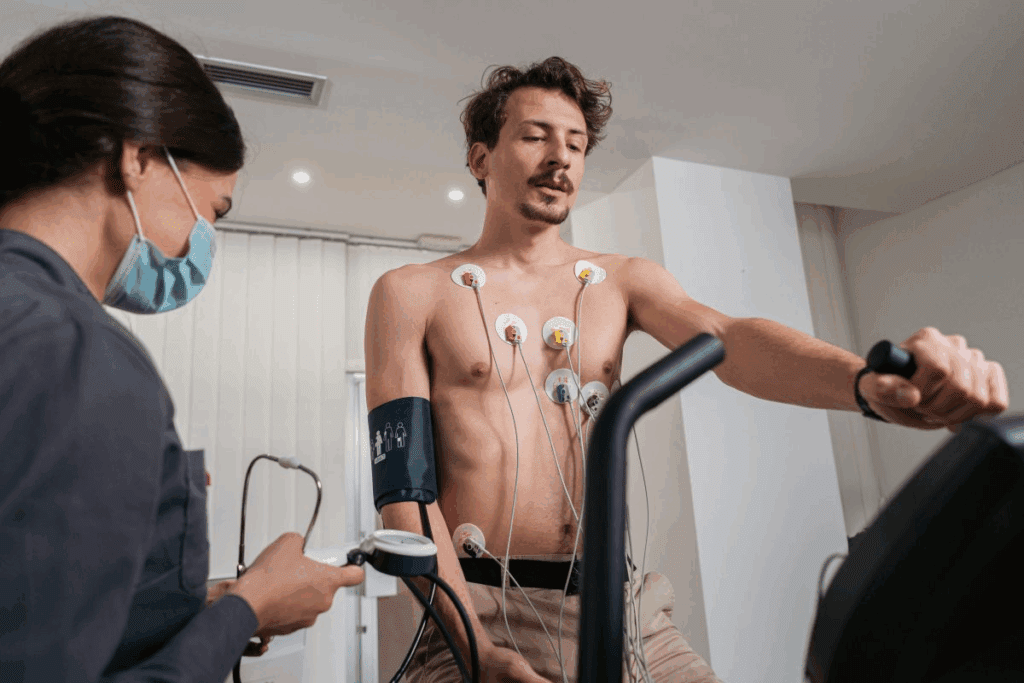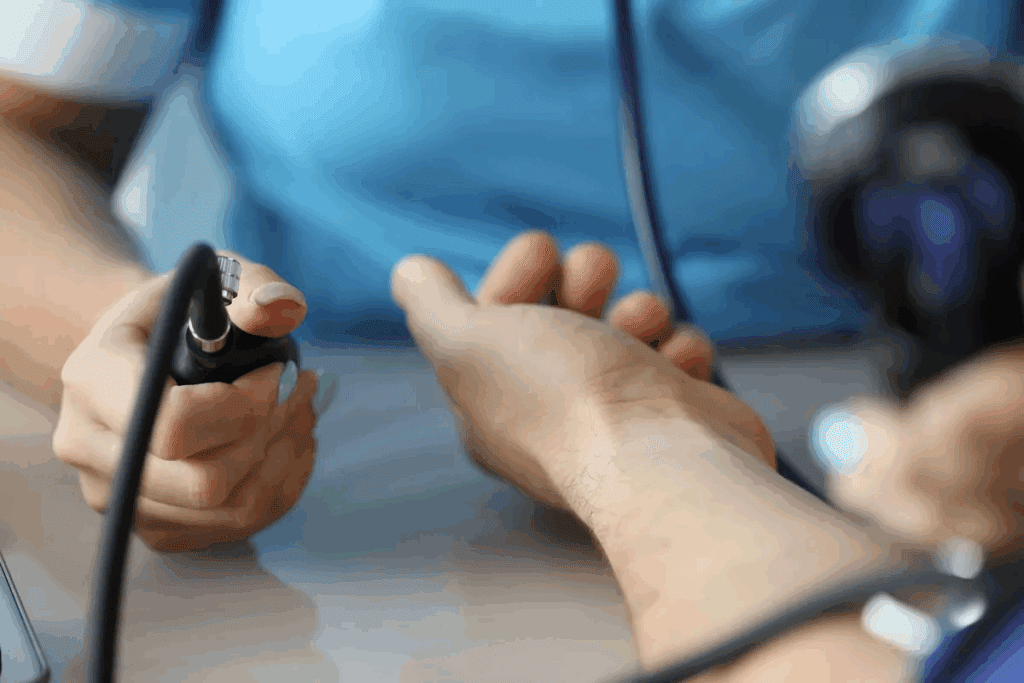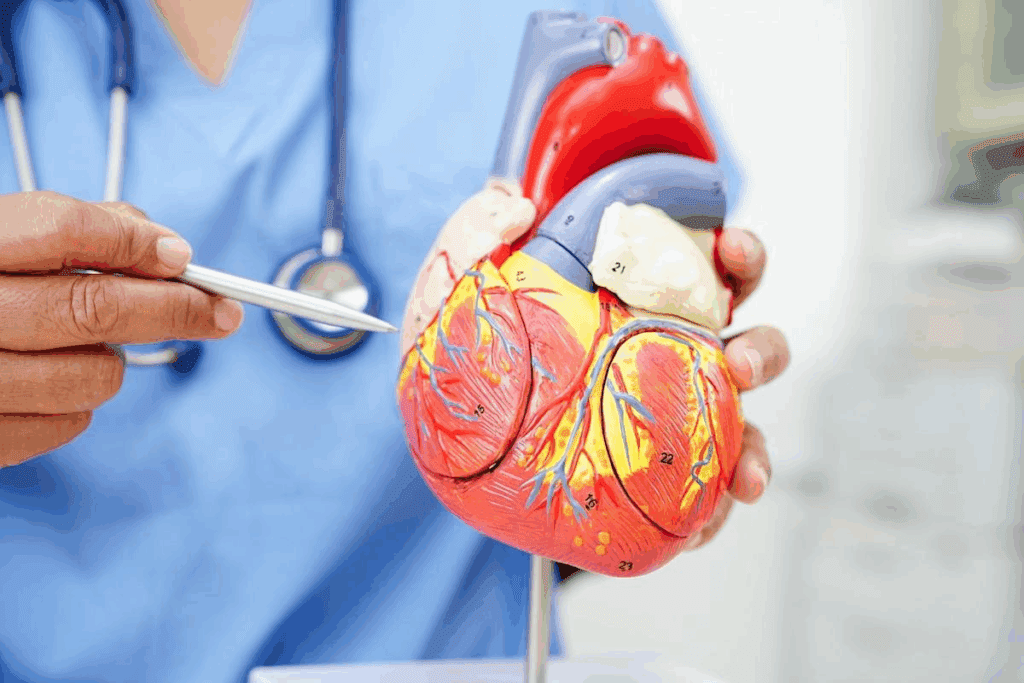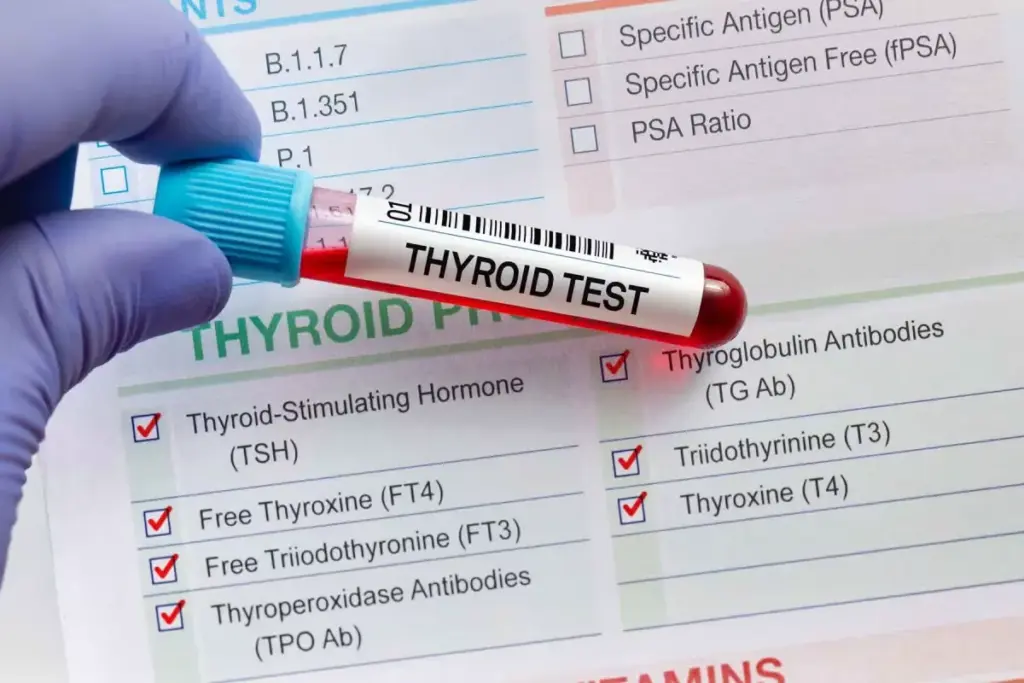
At Liv Hospital, we know how worried you can be about an enlarged heart. This happens when the heart muscle gets too thick or the chambers get bigger. This makes it harder for the heart to pump blood.
Signs you might have an enlarged heart include shortness of breath and chest pain. You might also notice swelling in your legs or belly, feel very tired, or have irregular heartbeats. When the heart can’t pump blood right, fluid can build up in your lungs. This makes it hard to breathe.
There are many reasons why your heart might get bigger. High blood pressure, heart valve problems, and blocked arteries are some of them. The right treatment can make you feel better and live a fuller life.
Key Takeaways
- An enlarged heart can lead to reduced efficiency in pumping blood.
- Common symptoms include shortness of breath, chest pain, and swelling.
- Underlying causes include high blood pressure and heart valve disease.
- Proper treatment can improve symptoms and quality of life.
- Lifestyle changes can also help manage the condition.
What Is an Enlarged Heart (Cardiomegaly)?

Cardiomegaly is when the heart gets bigger than normal. This usually happens because of different heart problems. An enlarged heart isn’t a disease itself but a sign of other heart and body issues that make it work too hard.
Definition and Medical Explanation
Cardiomegaly happens when the heart muscle gets thicker or the heart chambers get bigger. This can be caused by high blood pressure, heart valve issues, or heart muscle disease. We’ll look at these reasons in more detail later.
The heart has four chambers: the right and left atria, and the right and left ventricles. If any of these chambers get too big, it can cause cardiomegaly.
Types of Heart Enlargement
There are different kinds of heart enlargement, depending on which part of the heart is affected.
- Left Ventricular Hypertrophy: Thickening of the left ventricle wall.
- Left Atrial Enlargement: Enlargement of the left atrium, often due to conditions like mitral valve disease.
- Right Ventricular Hypertrophy: Thickening of the right ventricle wall, often seen in conditions like pulmonary hypertension.
- Right Atrial Enlargement: Enlargement of the right atrium.
| Type of Enlargement | Common Causes | Symptoms |
| Left Ventricular Hypertrophy | Hypertension, Aortic Stenosis | Shortness of breath, Chest pain |
| Left Atrial Enlargement | Mitral Valve Disease, Heart Failure | Palpitations, Shortness of breath |
| Right Ventricular Hypertrophy | Pulmonary Hypertension, Congenital Heart Disease | Fatigue, Swelling in legs |
How a Healthy Heart Differs from an Enlarged Heart
A healthy heart pumps blood well without getting tired. But an enlarged heart has to work harder, which can lead to heart failure if not treated. Doctors can spot an enlarged heart through tests like echocardiograms and chest X-rays.
Knowing about cardiomegaly is key to managing and treating it. We’ll talk about symptoms, causes, and treatments in the next sections.
Recognizing Enlarged Heart Symptoms

It’s important to know the signs of an enlarged heart. This helps in managing and treating it effectively. We’ll look at common symptoms and when to see a doctor.
Shortness of Breath During Activity and Rest
Shortness of breath, or dyspnea, is a key symptom. It can happen when you’re active or just resting. An enlarged heart can’t pump blood well, causing fluid in the lungs and breathing trouble.
Key points to note:
- Dyspnea can be a sign of heart failure, a possible complication of cardiomegaly.
- Shortness of breath during activity may indicate that the heart is struggling to meet the body’s needs.
- Resting dyspnea is a more severe symptom, suggesting advanced heart dysfunction.
Chest Pain and Discomfort Patterns
Chest pain or discomfort can be a sign of an enlarged heart. This pain can come from reduced blood flow to the heart or strain on it.
Characteristics of chest pain associated with an enlarged heart:
- Pressure or tightness in the chest
- Pain that radiates to the arms, back, or jaw
- Discomfort that worsens with activity or deep breathing
Edema: Swelling in Legs, Ankles, and Abdomen
Edema, or swelling, is a sign of fluid retention, often linked to heart failure. An enlarged heart may not pump well, causing fluid buildup in the body’s extremities and abdomen.
Areas commonly affected by edema:
- Legs and ankles
- Abdomen (ascites)
- Feet
Persistent Fatigue and Weakness
Feeling unusually tired or weak is common in people with an enlarged heart. Reduced cardiac output can lead to inadequate blood flow and oxygen delivery to muscles and organs, causing fatigue.
Factors contributing to fatigue in cardiomegaly:
- Reduced heart function
- Inadequate oxygen supply to tissues
- Potential anemia or other related conditions
Understanding these symptoms helps individuals seek timely medical evaluation and intervention. This can improve outcomes.
Primary Causes of Heart Enlargement
Many health issues can cause the heart to enlarge, which is a big worry for heart health. Knowing what causes this is key for stopping it and treating it.
Hypertension: The Leading Contributor
High blood pressure, or hypertension, is a top reason for heart enlargement. When blood pressure is too high, the heart works harder. This can make the heart muscle thicker, leading to enlargement over time.
Table 1: Effects of Hypertension on the Heart
| Effect | Description |
| Hypertrophy | Thickening of the heart muscle |
| Increased Heart Size | Enlargement of the heart chambers |
| Reduced Heart Function | Decreased efficiency in pumping blood |
Heart Valve Disease and Regurgitation
Heart valve disease happens when heart valves get damaged. This can cause blood to leak back, making the heart work harder. This can lead to the heart getting bigger.
“Heart valve disease can significantly impact the heart’s efficiency, leading to enlargement if not properly managed.”
— Medical Expert, Cardiologist
Coronary Artery Disease and Heart Attacks
Coronary artery disease narrows or blocks arteries due to plaque. This can cause heart attacks. Heart attacks damage the heart muscle, which can lead to scarring and enlargement.
Cardiomyopathy: Dilated, Hypertrophic, and Restrictive Types
Cardiomyopathy is diseases of the heart muscle. There are different types, like dilated cardiomyopathy, where the heart is too big and pumps poorly. Hypertrophic cardiomyopathy makes the heart muscle thick. Restrictive cardiomyopathy makes the heart muscle stiff.
Key Types of Cardiomyopathy:
- Dilated Cardiomyopathy
- Hypertrophic Cardiomyopathy
- Restrictive Cardiomyopathy
Secondary Factors That Can Cause an Enlarged Heart
Many medical conditions and changes in the body can make the heart bigger. While we know about high blood pressure and heart disease, other factors also play a big role in heart health.
Thyroid Disorders: Hyperthyroidism and Hypothyroidism
Thyroid problems, like too much or too little thyroid hormone, can harm the heart. Hyperthyroidism makes the heart beat faster and pump more blood, which can make the heart bigger. On the other hand, hypothyroidism can make the heart pump less, leading to heart failure if not treated.
Severe Anemia and Blood Disorders
Severe anemia and some blood problems can also make the heart bigger. Anemia, often from iron deficiency, makes the heart work harder to get oxygen to the body. This can cause the heart to enlarge. Blood disorders that affect red blood cells can also impact heart size and function.
Pulmonary Hypertension
Pulmonary hypertension is high blood pressure in the lungs’ blood vessels. It strains the right side of the heart, leading to thickening and enlargement. It’s important to manage this condition to protect the heart.
Pregnancy-Related Heart Changes
Pregnancy changes the heart and blood system, increasing blood volume and heart output. These changes usually go back to normal after pregnancy. But, women with heart problems or pregnancy complications may face a higher risk of heart enlargement.
The following table summarizes the secondary factors that can cause an enlarged heart:
| Secondary Factor | Description | Potential Impact on Heart Health |
| Thyroid Disorders | Hyperthyroidism and hypothyroidism | Increased heart rate, cardiac output changes, and heart enlargement risk |
| Severe Anemia | Reduced oxygen delivery to tissues | Increased heart rate and output, and heart enlargement risk |
| Pulmonary Hypertension | High blood pressure in pulmonary arteries | Right heart strain, right ventricular hypertrophy, and heart enlargement risk |
| Pregnancy-Related Changes | Increased blood volume and cardiac output | Reversible changes, but heart enlargement risk in women with pre-existing conditions or complications |
Diagnosing an Enlarged Heart
To find out if someone has an enlarged heart, we use many steps. This includes physical exams and special imaging tests. We check for symptoms that might mean the heart is bigger than usual.
Physical Examination Findings
First, we do a physical check-up. We look for swelling in the legs, ankles, and belly. We also listen for unusual heart sounds. These signs can tell us a lot about the heart.
Electrocardiogram (ECG/EKG) Results
An electrocardiogram (ECG or EKG) is a simple test. It shows how the heart’s electrical signals work. It can hint at heart problems, like an enlarged heart.
Imaging Tests: X-rays, Echocardiograms, CT, and MRI
Imaging tests help us see the heart clearly. – Chest X-rays can spot a big heart. – Echocardiograms use sound waves to show the heart’s details. – CT scans and MRI give us detailed pictures of the heart. They help us measure its size and find any issues.
Blood Tests and Biomarkers
Blood tests can find problems that might cause an enlarged heart. For example, they can check for anemia or thyroid issues. Tests like B-type natriuretic peptide (BNP) can show if the heart is failing.
| Diagnostic Test | Primary Use in Diagnosing Enlarged Heart |
| Physical Examination | Identifying signs of heart failure and other related conditions |
| Electrocardiogram (ECG/EKG) | Detecting arrhythmias and signs of heart strain |
| Imaging Tests (X-ray, Echocardiogram, CT, MRI) | Directly visualizing the heart size and structure |
| Blood Tests and Biomarkers | Identifying underlying conditions and heart failure markers |
By using all these tests together, we can find out if someone has an enlarged heart. Then, we can make a treatment plan that fits their needs.
Treatment Options for Cardiomegaly
Cardiomegaly treatment varies by person, focusing on symptoms, causes, and quality of life. We use a mix of medicines, lifestyle changes, and sometimes surgery.
Medications to Manage Symptoms and Underlying Conditions
Medicines are key in treating enlarged heart symptoms and causes. They include:
- ACE inhibitors to lower blood pressure and ease heart work.
- Beta-blockers to slow heart rate and reduce contraction force.
- Diuretics to remove body fluid, easing swelling and heart work.
- Anti-arrhythmic drugs to control irregular heartbeats.
These medicines are often combined for better results. The right one and how much depends on your health and history.
Surgical Interventions and Heart Devices
Surgery or heart devices might be needed for some. These include:
- Heart valve repair or replacement to fix valve issues.
- Coronary artery bypass grafting (CABG) to improve heart blood flow.
- Implantable cardioverter-defibrillators (ICDs) to prevent sudden death.
- Pacemakers to manage heart rhythm.
Lifestyle Modifications as Treatment
Changing your lifestyle is also key in treating cardiomegaly. We suggest:
- Dietary changes to lower salt, manage weight, and boost heart health.
- Regular exercise suited to your health and ability.
- Smoking cessation to cut down heart risks.
- Limiting alcohol to avoid more heart damage.
These lifestyle changes can greatly improve your symptoms and life quality.
Managing Underlying Conditions
It’s vital to manage underlying conditions to treat cardiomegaly. This means controlling high blood pressure, diabetes, and other conditions that can enlarge the heart.
| Condition | Management Strategy |
| Hypertension | Medications, lifestyle changes (diet, exercise) |
| Diabetes | Medications, lifestyle changes (diet, exercise) |
| Heart Valve Disease | Surgical repair or replacement, medications |
Controlling these conditions can lessen heart strain and improve health outcomes.
Complications of Untreated Heart Enlargement
Untreated heart enlargement can lead to serious health problems. When the heart gets too big, it may not pump blood well. This can cause many complications. It’s important to know these risks to see why quick medical help is needed.
Congestive Heart Failure (CHF) Development
One big problem is congestive heart failure (CHF). CHF happens when the heart can’t pump enough blood. This causes fluid to build up in the lungs and body. Symptoms include shortness of breath, fatigue, and swelling in the legs and ankles.
Arrhythmias and Electrical Disturbances
An enlarged heart can cause arrhythmias, or irregular heartbeats. This is because the heart muscle stretches and thickens. Arrhythmias can be very dangerous if not treated.
Blood Clots, Stroke, and Embolism Risk
The heart’s poor pumping can cause blood clots. These clots can travel and cause strokes or other problems. People with untreated heart enlargement face a higher risk of these issues.
Cardiac Arrest and Sudden Death Risk
In severe cases, an untreated enlarged heart can stop beating suddenly. This is called cardiac arrest. It’s deadly without quick CPR or a defibrillator. The risk of sudden death is very high for those with big heart problems.
The risks of untreated heart enlargement show why early diagnosis and treatment are key. Knowing these dangers helps people take action to avoid serious health problems.
Prevention Strategies and Risk Reduction
To avoid an enlarged heart, knowing the risks is key. By managing health conditions and living a heart-healthy lifestyle, you can lower your risk. This helps prevent heart enlargement.
Blood Pressure Management and Monitoring
High blood pressure is a big risk for an enlarged heart. Managing blood pressure is vital. This can be done through lifestyle changes or medication. Regular checks help catch high blood pressure early.
- Maintain a healthy weight to reduce strain on the heart.
- Follow a low-sodium diet to help control blood pressure.
- Exercise regularly, as recommended by healthcare providers.
Heart-Healthy Diet and Nutrition
Eating a heart-healthy diet is important. Focus on fruits, vegetables, whole grains, and lean proteins. Avoid too much saturated fats, trans fats, and cholesterol.
“A healthy diet is foundational to heart health. Focusing on nutrient-dense foods can help manage weight, improve blood lipid profiles, and control blood pressure.”
Exercise Recommendations for Heart Health
Regular exercise is vital for heart health. Aim for at least 150 minutes of moderate-intensity aerobic exercise, or 75 minutes of vigorous-intensity aerobic exercise, or a combination of both, per week.
- Start with low-impact activities like walking or swimming.
- Gradually increase the intensity and duration based on individual tolerance.
- Incorporate strength training exercises at least twice a week.
Stress Management Techniques
Chronic stress can harm the heart, including causing an enlarged heart. Engaging in stress-reducing activities like meditation, yoga, or deep breathing exercises can help manage stress.
By adding these prevention strategies to your daily life, you can lower your risk of an enlarged heart. This promotes better heart health overall.
Conclusion: Living with and Managing an Enlarged Heart
Living with an enlarged heart, or cardiomegaly, needs a full plan to manage it well. Knowing the causes, symptoms, and treatments helps people deal with their diagnosis. They can work closely with their healthcare team.
To manage cardiomegaly, a mix of medicine, lifestyle changes, and sometimes surgery is needed. Places like the Medical organization have teams that help with heart failure care. They offer treatments for enlarged hearts and support for CHF.
Following a heart-healthy diet and exercising regularly can help. Managing conditions like high blood pressure also reduces risks. With the right care, people with enlarged hearts can live active and happy lives.
FAQ
What is an enlarged heart, and what are its symptoms?
An enlarged heart, or cardiomegaly, happens when the heart muscle gets thick or the chambers get bigger. Symptoms include shortness of breath, chest pain, and feeling tired. You might also notice swelling in your legs and ankles, and feel your heart beating irregularly.
What causes heart enlargement?
Many things can cause an enlarged heart. High blood pressure and heart valve disease are common causes. Other factors include coronary artery disease, cardiomyopathy, thyroid disorders, and severe anemia.
How is an enlarged heart diagnosed?
Doctors use several methods to diagnose an enlarged heart. They start with a physical exam and an electrocardiogram (ECG/EKG). Imaging tests like X-rays, echocardiograms, CT scans, and MRI are also used. Blood tests check for biomarkers.
Can an enlarged heart be treated, and what are the treatment options?
Yes, there are treatments for an enlarged heart. Doctors may prescribe medications to manage symptoms and conditions. Surgery, heart devices, and lifestyle changes like a healthy diet and exercise are also options.
What are the complications of untreated heart enlargement?
If left untreated, an enlarged heart can lead to serious problems. These include congestive heart failure, arrhythmias, blood clots, and stroke. It can even cause cardiac arrest, increasing the risk of sudden death.
How can I reduce my risk of developing an enlarged heart?
To lower your risk, manage your blood pressure and eat a heart-healthy diet. Regular exercise, stress management, and avoiding smoking and too much alcohol are also important.
Is an enlarged heart a sign of underlying heart disease?
Yes, an enlarged heart often indicates underlying heart disease. This can include coronary artery disease, heart valve disease, or cardiomyopathy.
Can high blood pressure cause an enlarged heart?
Yes, high blood pressure is a major cause of heart enlargement. It makes the heart work harder, leading to thickening of the heart muscle.
What lifestyle changes can help manage an enlarged heart?
Making lifestyle changes can help manage an enlarged heart. Eating a heart-healthy diet, exercising regularly, managing stress, and avoiding smoking and too much alcohol are key.
Can an enlarged heart cause breathing problems?
Yes, an enlarged heart can lead to breathing issues. You might experience shortness of breath, even at rest, due to fluid buildup in the lungs.
References:
Martinez-Lemus, L. A. (2012). The dynamic structure of arterioles. Basic & Clinical Pharmacology & Toxicology, 110(1), 5-11. https://pubmed.ncbi.nlm.nih.gov/21989114/










